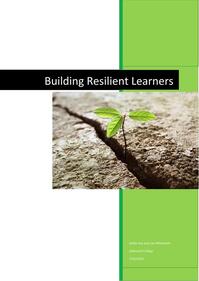Building Resilient Learners Project
|
Sidmouth College has led Building Resilient Learners (BRL) for 3 years, this includes the NESTA Future Ready Fund award and funding from the Institute for Effective Education. We have worked with partner schools from across the south west to help trial and implement the program. BRL includes a life skills course called ‘My Big Life’, which uses CBT techniques to help young people develop a toolkit of resilience and coping strategies.
We have reached hundreds of young people across 20 secondary schools and supported the development of their wellbeing, resilience and attendance at school. We already know that a large proportion of young people benefit from Building Resilient Learners and schools can implement the project as part of their compulsory Relationships, Sex and Health Education (RSHE) curriculum. All secondary schools are required to deliver RSHE from September 2020, we are able to support schools deliver the mental wellbeing strand of this new curriculum. DESCRIPTION OF BUILDING RESILIENT LEARNERS
Building Resilient Learners (BRL) is a collaboration between Sidmouth College (senior project lead – Lisa Whitworth), The University of Exeter (Research Associate – Hollie Gay) and Five Areas Ltd (Dr Chris Williams – Director), this project has been funded by the NESTA Future Ready Fund. Absence from class and school, low resilience and poor well-being have a negative impact on pupil engagement, outcomes and life chances. The aim of this project was therefore, to test whether an emotional health and wellbeing intervention can be effective in improving pupil’s wellbeing, which may in turn have a positive effect on their resilience, so that they felt settled in the classroom, were able to attend lessons and improve their school attendance. The intervention, aimed at Year 7 students with the lowest wellbeing scores, called ‘My Big Life’, was a six-week series of classes based on cognitive behaviour therapy principles. Each session lasted for one hour per week and was delivered as a life-skills lesson to a class of up to 20 students who were selected based on a screening of all year 7 students. The sessions aimed to develop pupils’ emotional wellbeing and provide them with strategies to cope with difficult emotions and situations. Students were given a small My Big Life card that summarised the techniques to use as a step before an exit card (exit cards provide time out of the lesson for the pupil; time out of the lesson may be limited to a few minutes or last the whole lesson). The application of these skills was supported by completion of a daily reflection journal, supported by a trained member of staff, where pupils recorded any situations they faced, what strategies they employed and how they felt about the outcome. Over the period of the intervention pupils gained an increasing toolkit of strategies that they were able to employ. SUMMARY OF THE EVALUATION This evaluation was carried out in 13 secondary schools in Devon, Somerset and Dorset, led by Sidmouth College, during the spring and summer term of 2020 to deliver the project and evaluation. All schools delivered the My Big Life course to a selected group of Year 7 pupils selected based on their identified by the whole year screen as having lower than their peers wellbeing scores. An original target of 15 schools were recruited with 13 secondary schools completing the evaluation. Schools were recruited from the south west region to take part from a range of demographic areas, there was a focus on recruiting schools in urban settings and schools with a higher proportion of students with pupil premium funding. In each of the partner schools we created an intervention group and a wait list control group in order to collect comparative data. A range of data was collected, including validated wellbeing and resilience measures, attendance data and the collation of daily reflective journals to build into qualitative analysis. As part of the evaluation from a previous iteration, we had found that students who had the lowest wellbeing scores on the Warwick Edinburgh Mental Well Being Scale (WEMWBS), improved in their school attendance most, with an average increase of 3%. When compared to the control group we saw an effect size of 0.5, which would be considered significant from a public health perspective. We therefore decided to screen all the Year 7 students to identify those with the lowest WEMWBS scores to take part in the intervention. The aim was to have 2 groups of 20 students in each partner school, both taken from the lowest scoring group of students, who were randomly allocated to the intervention or control group. At the start of the project 629 students had provided the partner schools with active consent and were able to complete the screening questionnaire. From this data 409 students were involved in the trial and analysis. In the intervention group there were 210 allocated to receive the My Big Life sessions. There were 199 students allocated into the wait list control group, who were to take part in the My Big Life session in the summer term of 2020. SUMMARY OF FINDINGS Our theory of change linked together wellbeing, resilience and attendance, we postulated that if we can support young people to improve their wellbeing, through teaching Cognitive Behaviour Therapy (CBT) techniques, their wellbeing and resilience would improve resulting in better attendance at school. Our findings support this hypothesis, with the exception of the attendance data. We used the Warwick Edinburgh Mental Well Being Scale (WEMWBS) as our measure of wellbeing. In the students with the lowest baseline WEMWBS scores, post intervention scores were statistically significantly greater in the intervention group (4.7 ± 1.2, p < .001) compared to the control group (.90 ± 1.1, p = .418), indicating the WEMWBS post score increased in the intervention group, but not control group, giving a large effect size This low wellbeing group showed an improvement in their resilience scores too, as measure by the Student Resilience Survey (SRS), here there was a statistically significant difference in SRS post scores between group allocations, F(1, 67) =4.558, p = .036, partial η² = .064, giving a medium effect size. Analysis of our attendance data shows no significant difference between the intervention and control groups, in our opinion this was partly caused by the impact of Covid 19 and preparation for lock down. We have collected a compelling body of qualitative evidence that the students involved in the intervention demonstrate a change in their behaviour and put into practice the CBT techniques that they have learnt. The reflective journals were recorded daily for the intervention group for the 6 weeks of the intervention. Overall, 67% of pupils stated they had done something differently. Reflective journal tick lists were also recorded on a daily basis. A total of 1395 tick lists were recorded across the five skills; what’s going on?’, advice, breathing, I’m OK and calm control. Goal based outcomes (GBO) were used in the journals by the students to self monitor their progress towards their own goal. Overall, 69% made a reliable improvement, meaning they made an improvement greater than would be due to expected measurement error. Students who chose a goal related to the school environment e.g. “To get a higher route in Science (revise)”, “Speak up in class”, made the least progress towards their goal (10 out of 19 pupils, 53% reliable improvement). When the data was separated by wellbeing, pupils with the lowest wellbeing (27% of sample) chose a goal categorised as emotional e.g. “To not get peed off and lash out”, “To stop crying over stupid things”. 60% of these pupils made reliable improvement towards their goal. Useful links:
NESTA - https://www.nesta.org.uk/blog/future-ready-fund-winners/ Email - [email protected] Twitter - twitter.com/resilientlearn |
Building Resilient Learners
Final Report Downloadable version:
| ||||||||








